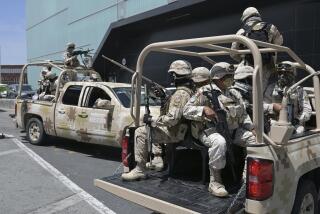U.S. Troops Move From Battle’s Heat to Police Beat
PANAMA CITY — When the trouble began Wednesday morning, Cpl. Eddie Sonnier of the Army’s 7th Infantry (Light) was manning his post in front of the Gago supermarket.
Just up the traffic-choked Avenida Transimica, a jet-black jeep had revved its engine, shifted gears and now was struggling to create a new lane by pushing aside one of the overturned cars that still litter the capital’s streets.
The city may have been a war zone just a few days ago, but by Wednesday, much of the U.S. Army here was in the business of law and order, and the black jeep was clearly breaking the rules.
Sonnier and Pvt. Santiago Hernandez sprang from their post and sprinted up the block, pulled the car to the curb and pointed their M-16 rifles at driver Oriel Mate.
“I didn’t know it would be a problem,” Mate said in desperation. “I had to get to work.” He even pulled a wad of $100 bills from his pocket and offered them to the Americans before they declined the bribe and sent him on his way.
“We’re combat troops,” Sonnier said as he walked back to his post. “I thought we’d be in the jungle by now.”
Instead, he and the rest of his unit were standing on street corners in the rain, an occupying force struggling to fill in for the vanquished Panamanian police.
All across the city Wednesday it was much the same, as U.S. soldiers who had only a week before felt the rush of adrenalin as they parachuted into Panama and fought fierce battles now found themselves getting lost in residential neighborhoods as they tried to patrol the streets and chase after rumored criminal hide-outs and caches of arms.
It was war at its most stultifying, leaving troops muttering beneath their yawns and hoping aloud that military police might soon take over the role of patrolling.
“Our job is over as far as we’re concerned,” said Sgt. Coit Darst, a paratrooper whose Bravo Company had only a week before raided the Marriott Hotel to free more than a dozen American hostages. “This is where the MPs ought to come in.”
But in the wake of an invasion that left Panama without practical civilian authority and forced its citizens to cope for themselves against bands of looters and thieves, U.S. commanders seemed determined to hasten the return of the capital to more normal times--even if it meant making police out of newly arrived infantrymen who spoke no Spanish and were unsure until a few days ago whether Panamanians drove on the right or left side of the road.
“We’re transitioning from combat to pacification,” said Army Brig. Gen. Joseph Kinzer, second in command of the 82nd Airborne, whose units have been given principal responsibility for restoring order to much of Panama City.
“What we need to do next is to complete the transition back to Panamanian control,” he said. “But that’s going to take some time.”
A reporter who accompanied Bravo Company on a four-hour urban patrol Wednesday afternoon found soldiers not only unenthusiastic but also ill-equipped for the pacification role.
A jeep with a .50-caliber machine gun mounted on its roof got lost several times on a journey from battalion headquarters near the beach at Panama Viejo to a hilltop command post less than two miles away, making necessary repeated U-turns in narrow residential streets.
The infantrymen stationed to patrol the hilly barrios nearby moved from site to site in a Mitsubishi Montero that a resourceful sergeant had hot-wired from the Marriott parking lot. Otherwise, the troops explained, the infantry wouldn’t rate its own transportation.
And most of the afternoon was spent on what one soldier referred to as yet “another wild goose chase” as the company investigated citizen complaints about a squalid El Barrako tenement rumored to house “hoodlums and thieves.”
Like a SWAT commander calling for backup units, Capt. Steve Phillips assembled dozens of troops outside the suspect building and called in a “psychological operations” unit to make a Spanish-language appeal via loudspeaker urging the inhabitants to surrender their weapons.
But the tenement proved to be filled almost entirely with women and children, and a suspected arms cache inside numbered exactly one gun.
Bored troops who waited outside griped about “police work” and wondered what was for dinner.
“We’re very sorry for disturbing your streets,” the psychological operations jeep announced in Spanish as the company rumbled its way back to base. “The Panamanian police will be back very soon.”
More to Read
Sign up for Essential California
The most important California stories and recommendations in your inbox every morning.
You may occasionally receive promotional content from the Los Angeles Times.









